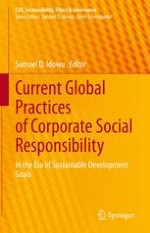This book addresses the status quo of Corporate Social Responsibility practices and their development since 2008. How have things changed in the practice of CSR? What new opportunities and challenges have arisen? The book reports on an international set of cases and case studies on how CSR is practiced at business and organizations in various countries. It analyzes country-specific and industry-specific issues, as well as general global issues in connection with the United Nations’ Sustainable Development Goals. The contributions gathered here provide comprehensive information on CSR for both practitioners and researchers around the globe.
